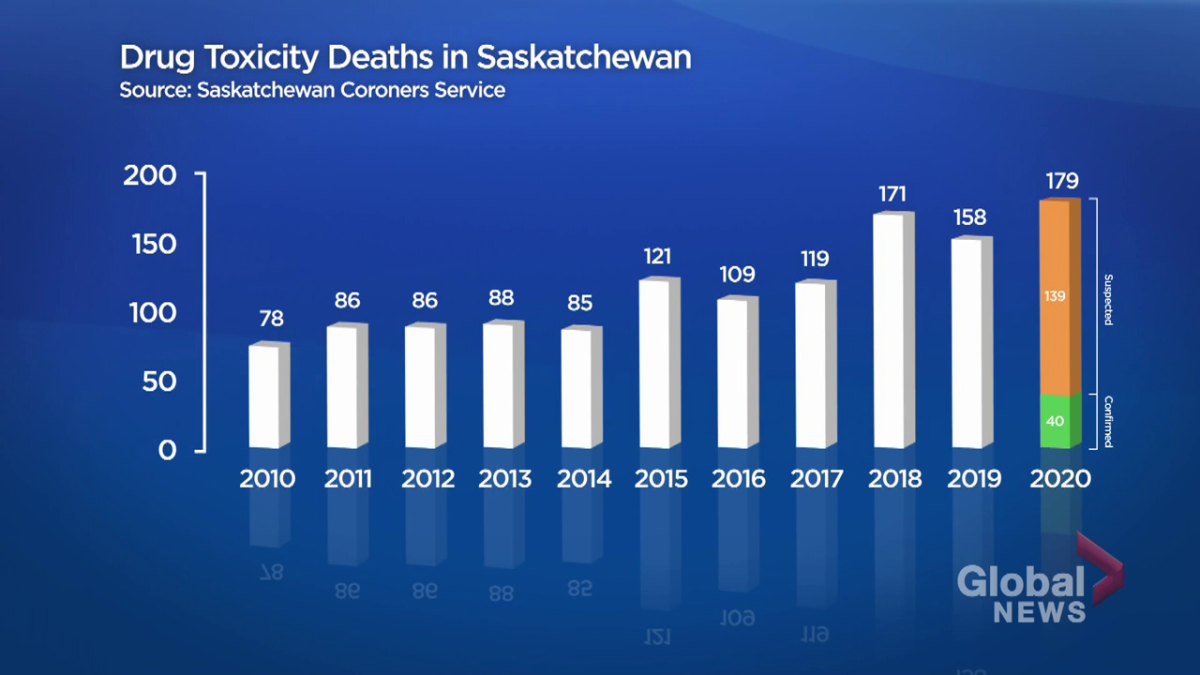New data from the Saskatchewan Coroners Service suggests that just seven months into 2020, Saskatchewan is already seeing a record high year for drug overdose numbers.

The coroner’s report shows that between Jan. 1 and Aug. 6, 139 people are suspected to have died as a result of “drug toxicity”. Forty people have already been confirmed to have died from that cause.
According to the Coroners Service, the most drug toxicity deaths in a single year since 2010 was in 2019 when 171 people were confirmed to have died from drug toxicity.
“We’re very concerned about it,” Saskatchewan Health Minister Jim Reiter said in response to the numbers. “We’re certainly heading in the wrong direction.”
In response, Reiter pointed to the “record” $435 million listed in the province’s most recent budget as for “mental health and addictions supports and services”.
- Jasper mayor says CN Rail relocation will be devastating: ‘Deeply disappointed’
- Retired Quebec teacher buys winning lottery ticket at last minute, wins $40M
- N.B. election: Higgs went to ‘very dark place’ with Liberal joke, opponent says
- GM, Volvo, Land Rover vehicles among those in big recall. What to know
“We’ve had an over $30 million increase in this year’s budget following an over $30 million increase in last year’s budget,” Reiter explained.
“Specific now to addictions, we announced the crystal meth treatment centre in Estevan. We’re hiring more services for counselling, and we’re adding detox beds. There’s a number of things we’ve put in the budget.”
Nearly $1.4 million is slated for the new inpatient treatment centre in Estevan, which will feature 15 beds for people recovering from crystal meth use and five beds for other addictions treatment needs. The centre is scheduled to open this year.

Get breaking National news
More than $1.7 million is dedicated for 28 new detox beds between Regina, Saskatoon, Moose Jaw, Prince Albert and North Battleford, and $400,000 is marked to create a new Rapid Access to Addiction Medicine Clinic in North Battleford.
But talk of investment is cheap for those who have been personally affected by the crisis.
“It’s that old saying of: ‘how do you eat an elephant? One bite at a time.’ We haven’t even brought a fork to the table for this thing,” said substance use disorder support advocate Marie Agioritis.
Agioritis lost one of her sons to overdose five years ago, and says her other son struggles with substance use disorder. She says that she hasn’t seen any kind of sustained downward trend in overdose numbers since she began speaking out about the matter.
“They keep telling us that they’re doing these things, and certainly the level of care hasn’t changed at all in the four years we’ve been advocating for these changes,” she said.
“Minister Reiter constantly says ‘we need to do better’. And I do honestly believe he means that. But my question to Minister Reiter is when?”
When asked about when Saskatchewan can start to see positive results, Reiter highlighted some of the challenges making a resolution difficult.
“There seems to be a correlation, people seem concerned, that in the time of COVID that the overdose deaths seem to be increasing. We tried to do as much addictions treatment as we could during COVID but some was scaled back,” Reiter said.
“That may have had an effect on this. Obviously it seems that there’s more dangerous drugs entering the system than there was in the past. That’s obviously played a role in this.
“We’re going to continue to increase services,” he added. “We’re going to look at everything.”
Agioritis has many ideas about how support and services can be improved. More widespread access to Naloxone kits is one.
She thinks the province would also benefit from having safe consumption sites. Though one is marked to open in Saskatoon later this year, Saskatchewan is yet to host such a facility.
While plans for safe consumption sites have caused controversy in other parts of Canada, Agioritis argued they can have many benefits.
“People think there’s going to loads of people suddenly deciding to use drugs irrationally and create addictions out of that,” Agioritis said. “In fact what a site does is look after wound care, helps people find housing, helps people stabilize and often helps them get access to support that helps them manage their addiction.”
Prairie Harm Reduction executive director Jason Mercredi, who spearheaded the effort to start the Saskatoon safe consumption site, knows first hand that opening such a facility can be a struggle.
“People need to be alive to get to those treatment centres. That’s where harm reduction sites like ours come into play. We need safe consumption sites in Saskatchewan,” he said.
Reiter, meanwhile, indicated safe consumption sites may be given more government focus in the future.
“The province just felt that right now, we needed to focus on addictions bed and counselling and those kinds of services,” he said.
“At some point I think that will be revisited. I can’t give you an actual date on that. We’re still implementing the budget that we introduced just a few weeks ago.”










Comments